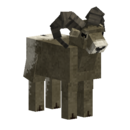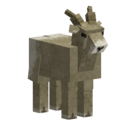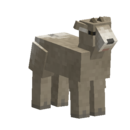Bighorn sheep: Difference between revisions
No edit summary |
Tag: Undo |
||
| Line 1: | Line 1: | ||
<languages/ | <languages /> | ||
{{AnimalTabs | {{AnimalTabs | ||
|Name=<translate><!--T: | |Name=<translate><!--T:12--> Bighorn Sheep</translate> | ||
|Title= <translate><!--T: | |Title= <translate><!--T:13--> Ram</translate> | ||
|Title2= <translate><!--T: | |Title2= <translate><!--T:14--> Ewe</translate> | ||
|Title3= <translate><!--T: | |Title3= <translate><!--T:15--> Lamb</translate> | ||
|image= File: | |image= File:Bighorn(Male).png | ||
|image2 = File: | |image2 = File:Bighorn(Female).png | ||
|image3 = File: | |image3 = File:Bighorn(Baby).png | ||
| | |HealthM= 19 | ||
|HealthB= | |HealthF= 17 | ||
|BaseAttackM=5 | |HealthB= 10 | ||
|BaseAttackF= | |BaseAttackM=7.5 | ||
|BaseAttackF=6 | |||
|BaseAttackB=0 | |BaseAttackB=0 | ||
|PortionsEaten=10 | |PortionsEaten=10 | ||
|GestationTime= | |GestationTime=480 | ||
|GrowthTime= | |GrowthTime= 336 | ||
|DropCode1={{ll|Redmeat|<translate><!--T: | |DropCode1={{ll|Redmeat|<translate><!--T:16--> Redmeat</translate>}} | ||
|DropAvg1= | |DropAvg1=16 | ||
|DropVar1= | |DropVar1=3 | ||
|DropCode2={{ll|Raw hide|<translate><!--T: | |DropCode2={{ll|Raw hide|<translate><!--T:17--> Raw Hide (Large)</translate>}} | ||
|DropAvg2=1. | |DropAvg2=1.2 | ||
|DropCode3={{ll|Fat|<translate><!--T: | |DropVar2=0.2 | ||
|DropAvg3= | |DropCode3={{ll|Fat|<translate><!--T:18--> Fat</translate>}} | ||
|DropCode4={{ll|Bone|<translate><!--T: | |DropAvg3=1 | ||
|DropAvg4= | |DropVar3=0.3 | ||
|DropCode4={{ll|Bone|<translate><!--T:19--> Bone</translate>}} | |||
|DropAvg4=5 | |||
|FloatRight=yes | |FloatRight=yes | ||
|NoBreak=yes | |NoBreak=yes | ||
| Line 33: | Line 34: | ||
<translate> | <translate> | ||
<!--T: | <!--T:20--> | ||
'''Bighorn sheep''' are one of the common animals found in the world, and are a source of redmeat, fat, hide, and bones. | |||
''' | |||
</translate> | </translate> | ||
| Line 43: | Line 41: | ||
<translate> | <translate> | ||
== Spawning == <!--T: | == Spawning == <!--T:21--> | ||
<!--T: | <!--T:22--> | ||
Bighorn sheep will spawn in light levels 10 and higher, at temperatures between -10 and 20, and in areas with as little as 0.43 rainfall. They spawn in average groups of 3 individuals. Technically, rams are the entity that is spawned and ewes and lambs are companions with the ram. | |||
== | == Behaviours == <!--T:23--> | ||
Like most animals, it’s a common sight to see the females staying close to the males and the young close to their mothers. You’ll typically find them wandering about, ignoring the player, and won’t act hostile unless provoked by attacking or getting too close (in the case of the Bighorn ram). The hostility also extends to the members of its group; that is, if a member of a herd close by is attacked, other members will also become aggressive. The hostility won’t last forever, though, since, if the sheep’s health gets too low (below 40%), it has an 85% chance to flee upon getting hit. | |||
== Domestication and Breeding == <!--T:24--> | |||
== | === Basics === <!--T:25--> | ||
<!--T: | <!--T:26--> | ||
After being rounded up in a pen, | After being rounded up in a pen, Bighorn sheep can be fed using a large trough which can hold 8 portions of food. The Bighorn ewes will need to have eaten at least 10 portions before they are willing to mate. After a pregnancy time of 20 days, ewes will bear one lamb at a time, chances for it to be male or female are 50/50. Lambs will take 336 hours to grow up, and the Ewes will need from 4 to 11 days break before they are ready to breed again. Note that male sheep (and sometimes the females) always attack players when in close range, but they will stop doing so after 10 generations of breeding. From the 3rd generation, the player can instantly kill Bighorn sheeps with a {{ll|Cleaver|cleaver}}. | ||
=== Food === <!--T: | === Food === <!--T:39--> | ||
<!--T: | <!--T:40--> | ||
Food that can be placed in the large trough to feed the | Food that can be placed in the large trough to feed the Bighorn sheep: | ||
</translate> | </translate> | ||
{|class="wikitable" | {|class="wikitable" | ||
|- | |- | ||
! <translate><!--T: | ! <translate><!--T:44--> Image</translate> !! <translate><!--T:45--> Food for Bighorn sheep</translate> | ||
|- | |- | ||
| [[File:Grid_Dry_Grass.png|32px]] || <translate><!--T: | | [[File:Grid_Dry_Grass.png|32px]] || <translate><!--T:46--> Dry grass</translate> | ||
|- | |- | ||
| [[File:Grid_spelt.png|32px]] || <translate><!--T: | | [[File:Grid_spelt.png|32px]] || <translate><!--T:47--> Spelt</translate> | ||
|- | |- | ||
| [[File:Grain-rye.png|32px]] || <translate><!--T: | | [[File:Grain-rye.png|32px]] || <translate><!--T:48--> Rye</translate> | ||
|- | |- | ||
| [[File:Grid_Flax_grain.png|32px]] || <translate><!--T: | | [[File:Grid_Flax_grain.png|32px]] || <translate><!--T:49--> Flax</translate> | ||
|- | |- | ||
| [[File:Grain-amaranth.png|32px]] || <translate><!--T: | | [[File:Grain-amaranth.png|32px]] || <translate><!--T:50--> Amaranth</translate> | ||
|- | |- | ||
| [[File:Grain-sunflower.png|32px]] || <translate><!--T: | | [[File:Grain-sunflower.png|32px]] || <translate><!--T:51--> Sunflower</translate> | ||
|- | |- | ||
| [[File: | | [[File:Legume-soybean.png|32px]] || <translate><!--T:52--> Soybean</translate> | ||
|- | |- | ||
| [[File: | | [[File:Vegetable-turnip.png|32px]] || <translate><!--T:53--> Turnip</translate> | ||
|- | |- | ||
| [[File: | | [[File:Carrot.png|32px]] || <translate><!--T:54--> Carrot</translate> | ||
|- | |- | ||
| [[File: | | [[File:Grid_onion.png|32px]] || <translate><!--T:55--> Onion</translate> | ||
|- | |- | ||
| [[File: | | [[File:Vegetable-cabbage.png|32px]] || <translate><!--T:56--> Cabbage</translate> | ||
|- | |- | ||
| [[File: | | [[File:Pressedmash-cranberry.png|32px]] || <translate><!--T:57--> Dry fruit mash</translate> | ||
|} | |||
<translate> | |||
=== Milking === <!--T:27--> | |||
<!--T:28--> | |||
After giving birth, ewes have a 21 day lactation period, when they can produce milk. If tooltips are enabled, a small sign over the sheep will indicate if it's lactating. The milk can either be consumed directly when taken from the bucket with a bowl, or used in a barrel to make {{ll|Cheese|cheese}}. Although ewes lactation doesn’t vary with generation, the milking process might vary: | |||
<!--T:29--> | |||
'''Generation 0-2:'''<br/> | |||
<ul><li> | |||
If you hold right click while carrying a bucket, you risk distressing the ewe, making it temporarily aggressive and interrupting the milking attempt. Exact chance for this to happen depends on generation: | |||
</translate> | |||
{|class="wikitable" | |||
|- | |- | ||
! <translate><!--T:58--> Generation</translate> !! <translate><!--T:59--> Distress Chance</translate> | |||
|- | |- | ||
| | | 0 || 95% | ||
|- | |- | ||
| | | 1 || 66.6% | ||
|- | |||
| 2 || 33.3% | |||
|} | |} | ||
<translate> | <translate> | ||
===Petting=== <!--T: | <!--T:38--> | ||
The best way to complete the milking involves holding right click up until the ewe feels distresses enough to reject your bucket. At that point, you must release right click and wait a few seconds until the ewe relaxes itself (this can be checked by reading the tooltip). Repeat this process until the bucket stays long enough for you to properly milk the animal. | |||
</li></ul> | |||
<!--T:30--> | |||
'''Generation 3 and above:'''<br/> | |||
* Ewes can be milked easily by just holding right click while holding a bucket. | |||
<!--T:31--> | |||
'''Note:'''<br /> | |||
* Ewes cannot be milked every day, despite lactating. This can be checked by reading the tooltip. | |||
===Petting=== <!--T:42--> | |||
<!--T: | <!--T:43--> | ||
You can {{Using|pet}} | You can {{Using|pet}} bighorn sheeps when they are generation 1 or higher. Petting causes the animal to stand peacefully. | ||
== Drops == <!--T: | == Drops == <!--T:32--> | ||
<!--T: | <!--T:33--> | ||
{{SneakClick|Butcher}} the animal by right-clicking while crouching with a {{ll|Knife|knife}} in the active hand to harvest its corpse. | {{SneakClick|Butcher}} the animal by right-clicking while crouching with a {{ll|Knife|knife}} in the active hand to harvest its corpse. | ||
<!--T:5--> | <!--T:34--> | ||
'''An adult | '''An adult ram drops:'''<br /> | ||
* | * 10-16 raw redmeat | ||
* 1-2 raw hide ( | * 1-2 raw hide (large) | ||
* 2 fat | * 0-2 fat | ||
* | * 5 bones | ||
'''A | |||
<!--T:35--> | |||
'''An adult ewe drops:'''<br /> | |||
* 13-19 raw redmeat | |||
* 1-2 raw hide (large) | |||
* 0-2 fat | |||
* 5 bones | |||
<!--T:36--> | |||
'''A baby lamb drops:''' <br /> | |||
* 0-1 raw redmeat | * 0-1 raw redmeat | ||
* 0-1 raw hide (small) | |||
</translate> | |||
{{Entities navbox}} | {{Entities navbox}} | ||
{{Game navbox}} | {{Game navbox}} | ||
[[Category:Creatures{{#translation:}}]] | [[Category:Creatures{{#translation:}}]] | ||
[[Category:Animals{{#translation:}}]] | |||
[[Category:Domesticated animals{{#translation:}}]] | [[Category:Domesticated animals{{#translation:}}]] | ||
Revision as of 06:08, 5 August 2023
| Bighorn Sheep | |
| Health | |
| Health (Ram) | 19 |
| Health (Ewe) | 17 |
| Health (Lamb) | 10 |
| Attack | |
| Base Attack (Ram) | 7.5 |
| Base Attack (Ewe) | 6 |
| Base Attack (Lamb) | 0 |
| Behavior | |
| Multiply | |
| Satiety to Mate (portions) | 10 |
| Gestation Time (days) | 480 |
| Growth Time (days) | 336 |
| Drops | |
| Redmeat | 13 - 19* |
| Raw Hide (Large) | 1 - 1.4* |
| Fat | 0.7 - 1.3* |
| Bone | 5* |
| Bone | 5* |
| Bone | 5* |
| Animals | |
Bighorn sheep are one of the common animals found in the world, and are a source of redmeat, fat, hide, and bones.
Spawning
Bighorn sheep will spawn in light levels 10 and higher, at temperatures between -10 and 20, and in areas with as little as 0.43 rainfall. They spawn in average groups of 3 individuals. Technically, rams are the entity that is spawned and ewes and lambs are companions with the ram.
Behaviours
Like most animals, it’s a common sight to see the females staying close to the males and the young close to their mothers. You’ll typically find them wandering about, ignoring the player, and won’t act hostile unless provoked by attacking or getting too close (in the case of the Bighorn ram). The hostility also extends to the members of its group; that is, if a member of a herd close by is attacked, other members will also become aggressive. The hostility won’t last forever, though, since, if the sheep’s health gets too low (below 40%), it has an 85% chance to flee upon getting hit.
Domestication and Breeding
Basics
After being rounded up in a pen, Bighorn sheep can be fed using a large trough which can hold 8 portions of food. The Bighorn ewes will need to have eaten at least 10 portions before they are willing to mate. After a pregnancy time of 20 days, ewes will bear one lamb at a time, chances for it to be male or female are 50/50. Lambs will take 336 hours to grow up, and the Ewes will need from 4 to 11 days break before they are ready to breed again. Note that male sheep (and sometimes the females) always attack players when in close range, but they will stop doing so after 10 generations of breeding. From the 3rd generation, the player can instantly kill Bighorn sheeps with a cleaver.
Food
Food that can be placed in the large trough to feed the Bighorn sheep:
| Image | Food for Bighorn sheep |
|---|---|
| Dry grass | |
| Spelt | |
| Rye | |
| Flax | |
| Amaranth | |
| Sunflower | |
| Soybean | |
| Turnip | |
| Carrot | |
| Onion | |
| Cabbage | |
| Dry fruit mash |
Milking
After giving birth, ewes have a 21 day lactation period, when they can produce milk. If tooltips are enabled, a small sign over the sheep will indicate if it's lactating. The milk can either be consumed directly when taken from the bucket with a bowl, or used in a barrel to make cheese. Although ewes lactation doesn’t vary with generation, the milking process might vary:
Generation 0-2:
-
If you hold right click while carrying a bucket, you risk distressing the ewe, making it temporarily aggressive and interrupting the milking attempt. Exact chance for this to happen depends on generation:
Generation Distress Chance 0 95% 1 66.6% 2 33.3% The best way to complete the milking involves holding right click up until the ewe feels distresses enough to reject your bucket. At that point, you must release right click and wait a few seconds until the ewe relaxes itself (this can be checked by reading the tooltip). Repeat this process until the bucket stays long enough for you to properly milk the animal.
Generation 3 and above:
- Ewes can be milked easily by just holding right click while holding a bucket.
Note:
- Ewes cannot be milked every day, despite lactating. This can be checked by reading the tooltip.
Petting
You can pet bighorn sheeps when they are generation 1 or higher. Petting causes the animal to stand peacefully.
Drops
Butcher the animal by right-clicking while crouching with a knife in the active hand to harvest its corpse.
An adult ram drops:
- 10-16 raw redmeat
- 1-2 raw hide (large)
- 0-2 fat
- 5 bones
An adult ewe drops:
- 13-19 raw redmeat
- 1-2 raw hide (large)
- 0-2 fat
- 5 bones
A baby lamb drops:
- 0-1 raw redmeat
- 0-1 raw hide (small)
| Entities | |
|---|---|
| Passive | Chicken • Raccoon • Gazelle • Salmon • Butterfly • Hare • Traders • Termite |
| Neutral | Bees • Bighorn sheep • Wild pig • Fox |
| Hostile | Wolf • Hyena • Bear • Drifter • Immobilized eidolon • Locust • Bell |
| Wiki Navigation | |
|---|---|
| Vintage Story | Guides • Frequently Asked Questions • Soundtrack • Versions • Controls |
| Game systems | Crafting • Knapping • Clay forming • Smithing • Cooking • Temperature • Hunger • Mining • Temporal stability • Mechanical power • Trading • Farming • Animal husbandry |
| World | World generation • Biomes • Weather • Temporal storms |
| Items | Tools • Weapons • Armor • Clothing • Bags • Materials • Food |
| Blocks | Terrain • Plants • Decorative • Lighting • Functional • Ore |
| Entities | Hostile entities • Animals • NPCs • Players |
| Miscellaneous | List of client commands • List of server commands • Creative Starter Guide • Bot System • WorldEdit • Cinematic Camera • Adjustable FPS Video Recording • ServerBlockTicking |


